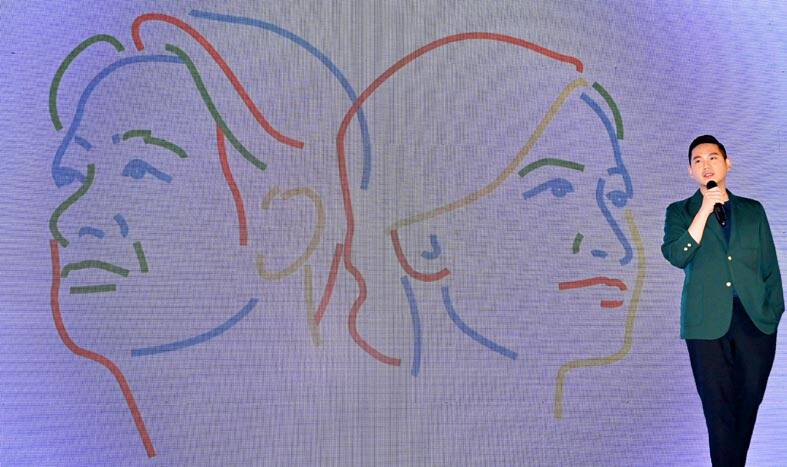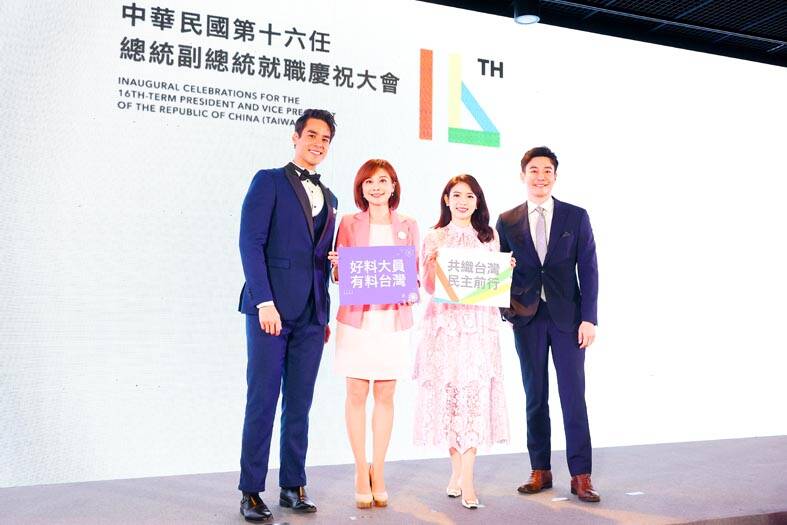Organizers yesterday unveiled the design for the presidential inauguration ceremony, which features a four-color theme symbolizing Taiwanese values.
The organizers, the General Association of Chinese Culture, said that the neat and simple design for the May 20 ceremony is centered on ribbons of four colors — red, yellow, green and blue — to symbolize freedom, democracy, confidence and friendship respectively.
The design represents people in Taiwan from various backgrounds and with different values interacting with and supporting each other, said Yen Design founder and director Yen Po-chun (顏伯駿), who is in charge of the design.

Photo: George Tsorng, Taipei Times
Stylized portraits of president-elect William Lai (賴清德) and vice president-elect Hsiao Bi-khim (蕭美琴) using the four colors symbolize hope that the two would lead Taiwanese to a better future, Yen told a news conference in Taipei.
The organizers have prepared five items each for people who attend the ceremony — a sun hat, a towel, an amulet, a set of two badges and a bottle of water — all with the four-color design, he said.
One of the badges bears the portraits of Lai and Hsiao, and the other images of a dog and a cat — as Lai is a dog person and Hsiao a cat person — symbolizing that people with different stances can share a better future, he said.

Photo: CNA
For the first time, the ceremony is to include performances by a cappella choirs, and Hakka and Hoklo-language (also known as Taiwanese) rappers on a stage that can be raised and lowered, Lai’s campaign office spokeswoman Kuo Ya-hui (郭雅慧) said.
There are also to be performances by groups from the National Taiwan College of Performing Arts, the Taiwan Acrobatic Troupe, the Chio Tian Folk Drums and Arts Troupe, the Taipei Municipal Chien Kuo High School Marching Band, National Taiwan University of Sport, Best Crew Dance Studio, Paper Windmill Theatre, Vuize (王鐘惟), KE (柯蕭), the Taipei Male Choir, Ilid Kaolo, the Dashing Theater, Since Chou (周自從), Juang Jing Vocational High School, Fire Ex and LaBa LaVa, Kuo said.
On the night of the ceremony, a state banquet is to be held in Tainan to mark the 400th anniversary of the city’s founding, she said, adding that singer Hsieh Ming-yu (謝銘佑), the Yowuwei Children’s Choir, cellist Kenneth Kuo (郭虔哲) and Siri Lee (李竺芯) are to perform at the banquet.
The ceremony is to be hosted by SET News anchor Jasmine Liu (劉宸希) and Taiwan Plus journalist Ethan Liu (劉傑中), while the banquet is to be hosted by herself and model Kevin Tai (戴凱文), Kuo added.
The inauguration ceremony and the state banquet are invitation-only, but the events are to be broadcast live, she added.
An area would be set up at the intersection of Ketagalan Boulevard and Gongyuan Road in Taipei for public viewing, she said.
There would be surprises and more details revealed in the next few days, she said.

Chinese Nationalist Party (KMT) Chairman Eric Chu (朱立倫), spokeswoman Yang Chih-yu (楊智伃) and Legislator Hsieh Lung-chieh (謝龍介) would be summoned by police for questioning for leading an illegal assembly on Thursday evening last week, Minister of the Interior Liu Shyh-fang (劉世芳) said today. The three KMT officials led an assembly outside the Taipei City Prosecutors’ Office, a restricted area where public assembly is not allowed, protesting the questioning of several KMT staff and searches of KMT headquarters and offices in a recall petition forgery case. Chu, Yang and Hsieh are all suspected of contravening the Assembly and Parade Act (集會遊行法) by holding

PRAISE: Japanese visitor Takashi Kubota said the Taiwanese temple architecture images showcased in the AI Art Gallery were the most impressive displays he saw Taiwan does not have an official pavilion at the World Expo in Osaka, Japan, because of its diplomatic predicament, but the government-backed Tech World pavilion is drawing interest with its unique recreations of works by Taiwanese artists. The pavilion features an artificial intelligence (AI)-based art gallery showcasing works of famous Taiwanese artists from the Japanese colonial period using innovative technologies. Among its main simulated displays are Eastern gouache paintings by Chen Chin (陳進), Lin Yu-shan (林玉山) and Kuo Hsueh-hu (郭雪湖), who were the three young Taiwanese painters selected for the East Asian Painting exhibition in 1927. Gouache is a water-based

Taiwan would welcome the return of Honduras as a diplomatic ally if its next president decides to make such a move, Minister of Foreign Affairs Lin Chia-lung (林佳龍) said yesterday. “Of course, we would welcome Honduras if they want to restore diplomatic ties with Taiwan after their elections,” Lin said at a meeting of the legislature’s Foreign Affairs and National Defense Committee, when asked to comment on statements made by two of the three Honduran presidential candidates during the presidential campaign in the Central American country. Taiwan is paying close attention to the region as a whole in the wake of a

OFF-TARGET: More than 30,000 participants were expected to take part in the Games next month, but only 6,550 foreign and 19,400 Taiwanese athletes have registered Taipei city councilors yesterday blasted the organizers of next month’s World Masters Games over sudden timetable and venue changes, which they said have caused thousands of participants to back out of the international sporting event, among other organizational issues. They also cited visa delays and political interference by China as reasons many foreign athletes are requesting refunds for the event, to be held from May 17 to 30. Jointly organized by the Taipei and New Taipei City governments, the games have been rocked by numerous controversies since preparations began in 2020. Taipei City Councilor Lin Yen-feng (林延鳳) said yesterday that new measures by